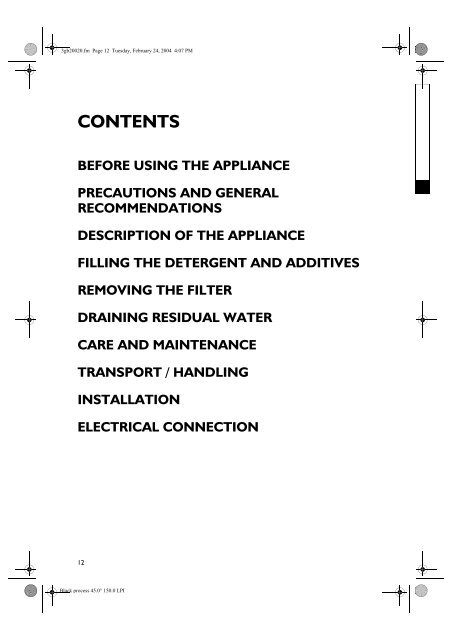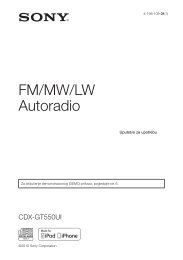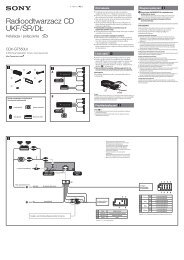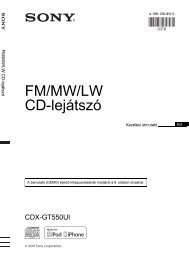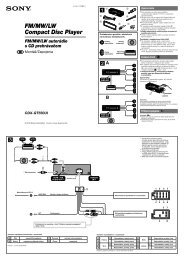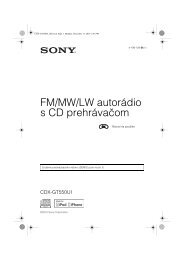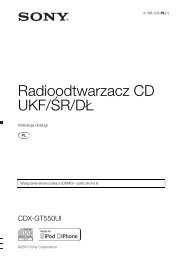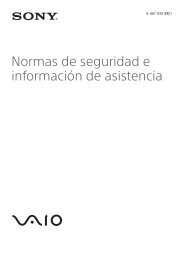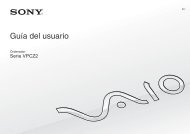KitchenAid PDP 819/P - PDP 819/P EN (858042149600) Istruzioni per l'Uso
KitchenAid PDP 819/P - PDP 819/P EN (858042149600) Istruzioni per l'Uso
KitchenAid PDP 819/P - PDP 819/P EN (858042149600) Istruzioni per l'Uso
You also want an ePaper? Increase the reach of your titles
YUMPU automatically turns print PDFs into web optimized ePapers that Google loves.
3gb20020.fm Page 12 Tuesday, February 24, 2004 4:07 PM<br />
CONT<strong>EN</strong>TS<br />
BEFORE USING THE APPLIANCE<br />
PRECAUTIONS AND G<strong>EN</strong>ERAL<br />
RECOMM<strong>EN</strong>DATIONS<br />
DESCRIPTION OF THE APPLIANCE<br />
FILLING THE DETERG<strong>EN</strong>T AND ADDITIVES<br />
REMOVING THE FILTER<br />
DRAINING RESIDUAL WATER<br />
CARE AND MAINT<strong>EN</strong>ANCE<br />
TRANSPORT / HANDLING<br />
INSTALLATION<br />
ELECTRICAL CONNECTION<br />
12<br />
Black process 45.0° 150.0 LPI
3gb20020.fm Page 13 Tuesday, February 24, 2004 4:07 PM<br />
BEFORE USING THE APPLIANCE<br />
1.Removing the packaging and inspection<br />
• After unpacking, make sure that the appliance is<br />
undamaged. If in doubt, do not use the appliance.<br />
Contact After-Sales Service or your local retailer.<br />
• Keep the packaging materials (plastic bags,<br />
polystyrene parts, etc.) out of reach of children,<br />
as they are potentially dangerous.<br />
2.Remove the transport bolts<br />
• The appliance is fitted with transport bolts to<br />
prevent internal damage during transport.<br />
Before using the appliance, you must<br />
remove the transport bolts (see “Installation/<br />
Remove the transport bolts”).<br />
3.Install the appliance<br />
• Move the appliance without carrying it by the<br />
worktop.<br />
• Install the appliance on a solid and level floor<br />
surface, preferably in a corner of the room.<br />
• Make sure that all four feet are stable and resting on<br />
the floor and then check that the appliance is<br />
<strong>per</strong>fectly level using a spirit level (see Installation/<br />
Adjust the feet”).<br />
4.Water supply<br />
• Connect the water supply inlet hose in<br />
accordance with the regulations of your local<br />
water company (see “Installation/Connect the<br />
water inlet hose”).<br />
• Water supply: Cold water only<br />
• Tap:<br />
3/4” threaded hose<br />
connector.<br />
• Pressure:<br />
0.05-1.00 MPa<br />
(0.5-10 bar).<br />
5.Drain<br />
• Connect the drain hose to the siphon or hook it<br />
over the edge of a sink with the “U” bend<br />
(see “Installation/Connect the water drain hose”).<br />
• If the appliance is connected to a built-in drainage<br />
system, ensure the latter is equipped with a vent<br />
to avoid simultaneous loading and draining of<br />
water (siphoning effect).<br />
6.Electrical connection<br />
• Electrical connections must be carried out by a<br />
qualified technician in compliance with the<br />
manufacturer’s instructions and current standard<br />
safety regulations.<br />
• Voltage information, power consumption and<br />
electrical protection data are supplied on the<br />
inside of the filter cover.<br />
• The appliance must be connected exclusively by<br />
means of a socket with an earth connection in<br />
accordance with current regulations. The<br />
appliance must be earthed by law. The<br />
manufacturer declines all liability for damage to<br />
<strong>per</strong>sons or pro<strong>per</strong>ty deriving directly or<br />
indirectly from failure to observe the directions.<br />
• Do not use extension leads or multi sockets.<br />
• Before any maintenance on the appliance<br />
disconnect it from the mains supply.<br />
• After installation, access to the mains plug or<br />
disconnection from the mains supply must be<br />
ensured at all times via a double-pole switch.<br />
• Do not o<strong>per</strong>ate the appliance if it has been<br />
damaged during transport. Inform the After-Sales<br />
Service.<br />
• Mains cable replacement is only to be carried out<br />
by After-Sales Service.<br />
• The appliance must only be used in the<br />
household for the prescribed uses.<br />
13<br />
Black process 45.0° 150.0 LPI
3gb20020.fm Page 14 Tuesday, February 24, 2004 4:07 PM<br />
PRECAUTIONS AND G<strong>EN</strong>ERAL<br />
RECOMM<strong>EN</strong>DATIONS<br />
1.Packing<br />
• The packing material is recyclable as indicated by the<br />
recycling symbol . Adhere to local regulations<br />
when disposing of packaging material.<br />
2.Energy saving tips<br />
• Achieve the best use of energy, water, detergent and<br />
time by using the recommended maximum load size.<br />
• Do not exceed manufacturers’ recommended<br />
dosages as shown on the detergent package.<br />
• The Eco Flap - a special system in the outlet - will<br />
prevent detergent loss from the drum to avoid<br />
detergent loss into the environment.<br />
• Use “Prewash” for heavily soiled laundry only!<br />
Save detergent, time, water and energy<br />
consumption by not selecting “Prewash” for slight<br />
to normally soiled laundry. You save on water,<br />
energy and time as a result.<br />
• Pretreat stains with stain remover or soak dried in<br />
stains in water before washing to reduce the<br />
necessity of a hot wash program.<br />
• Save energy by using a 60° C instead of a 90° C<br />
wash programme or a 40° C instead of a 60° C<br />
wash programme.<br />
• Save energy and time by selecting a high spin<br />
speed to reduce the water content in laundry<br />
before using a drying programme (for appliances<br />
with adjustable spin speed).<br />
3.Disposing of packaging and old<br />
appliances<br />
• The appliance is built from reusable materials.<br />
Dispose of the appliance in conformity with<br />
environmental regulations.<br />
• Before scrapping, cut off the power cable so that the<br />
appliance cannot be connected to the mains.<br />
• Remove detergent from compartment if you<br />
intend scrapping your appliance.<br />
4.Child safety<br />
• Children must not be allowed to play with the<br />
appliance.<br />
5.General recommendations<br />
• When the appliance is not in use unplug it and<br />
turn off the tap.<br />
• Before cleaning or carrying out maintenance<br />
switch off the appliance and disconnect it from<br />
the mains supply.<br />
• To clean the outside of the appliance, use a<br />
neutral detergent and a damp cloth.<br />
• Do not use abrasive detergents.<br />
• Do not attempt to force the door open.<br />
• If necessary, the power cable may be replaced<br />
with an identical one obtained from our<br />
After-Sales Service. The power cable must only<br />
be replaced by a qualified technician.<br />
6.EC Declaration of Conformity<br />
• This appliance has been designed, constructed<br />
and distributed in compliance with the safety<br />
requirements of EC Directives:<br />
73/23/EEC Low Voltage Directive<br />
89/336/EEC Electromagnetic Compatibility<br />
Directive<br />
93/68/EEC CE Marking Directive .<br />
14<br />
Black process 45.0° 150.0 LPI
3gb20020.fm Page 15 Tuesday, February 24, 2004 4:07 PM<br />
DESCRIPTION OF THE APPLIANCE<br />
1. Worktop<br />
2. Control panel<br />
3. Detergent dispenser<br />
4. Door<br />
5. Door handle<br />
• To open the door press the button inside<br />
the handle and pull.<br />
• Close the door by pushing it firmly (the lock<br />
will click into place)<br />
6. Filter (behind cover)<br />
7. After-Sales Service sticker (inside door)<br />
8. Adjustable feet<br />
9. Technical specifications sticker (inside cover)<br />
3<br />
7<br />
8<br />
1<br />
2<br />
4<br />
5<br />
6<br />
9<br />
Minimum housing dimensions<br />
Width<br />
595 mm<br />
Height<br />
850 mm<br />
Depth (depending on the appliance)<br />
395 or 335 mm / 530 or 580 mm<br />
FILLING THE DETERG<strong>EN</strong>T AND ADDITIVES<br />
1. Pull out the detergent dispenser completely, until the limit.<br />
The dispenser has three chambers.<br />
2. Add the detergent:<br />
• Programme with pre- and main wash<br />
• Main wash programme without prewash<br />
• Fabric softeners, conditioners and chlorine<br />
bleach: no more than to “MAX” mark<br />
• Stain remover<br />
• Water softener (water hardness class 4)<br />
• Starch (dissolved in water)<br />
3. Close the detergent dispenser completely.<br />
Water hardness: soft water requires less detergent.<br />
WATER HARDNESS<br />
CATEGORY:<br />
1<br />
2<br />
3<br />
4<br />
CHARACTERISTICS<br />
soft<br />
average<br />
hard<br />
very hard<br />
GERMAN<br />
°dh<br />
0-7<br />
7-14<br />
14-21<br />
over 21<br />
FR<strong>EN</strong>CH<br />
°fh<br />
0-12<br />
12-25<br />
25-37<br />
over 37<br />
<strong>EN</strong>GLISH<br />
°eh<br />
0-9<br />
9-17<br />
17-26<br />
over 26<br />
15<br />
Black process 45.0° 150.0 LPI
3gb20020.fm Page 16 Tuesday, February 24, 2004 4:07 PM<br />
REMOVING THE FILTER<br />
1. Stop the appliance and unplug it.<br />
2. Open the filter cover.<br />
3. Place a bowl beneath the filter.<br />
4. Slowly turn the filter anticlockwise without extracting<br />
it as yet.<br />
5. Wait until all the water has drained.<br />
6. Now unscrew the filter completely and extract it.<br />
7. Remove any foreign items from the foreign body trap.<br />
8. Insert the filter and screw it in clockwise until it locks,<br />
making sure it is hermetically closed.<br />
9. Close the cover.<br />
10. Pour 0.5 l of water into the detergent dispenser to<br />
reactivate the “Eco System”.<br />
11. Connect the appliance to the electrical outlet.<br />
12. Select a programme and start it.<br />
Check the filter two or three times a year and clean it if<br />
necessary.<br />
• Check the filter if the appliance is not draining correctly<br />
or if it fails to <strong>per</strong>form spin cycles.<br />
IMPORTANT: Make sure the water has cooled<br />
before draining the appliance.<br />
DRAINING RESIDUAL WATER<br />
• To drain the residual water from the pump, tilt the appliance forwards and proceed as <strong>per</strong> points 8 and<br />
10 of the previous chapter.<br />
When should I drain residual water?<br />
• Before transporting (moving) the appliance.<br />
• If the appliance is installed in a room subject to sub-zero tem<strong>per</strong>atures.<br />
In this case the appliance should be drained after every wash.<br />
16<br />
Black process 45.0° 150.0 LPI
3gb20020.fm Page 17 Tuesday, February 24, 2004 4:07 PM<br />
CARE AND MAINT<strong>EN</strong>ANCE<br />
Appliance exterior and control panel<br />
• Clean using normal household cleaner (do not<br />
use abrasive products and no solvents).<br />
• Dry with a soft cloth.<br />
Door seal<br />
• Clean with a damp cloth when necessary.<br />
• Check the condition of the door seal <strong>per</strong>iodically.<br />
Filter<br />
• Check and clean the filter two or three times a<br />
year (see “Removing the Filter”).<br />
Detergent dispenser (depending on model)<br />
1. Disengage the detergent dispenser by pressing the release lever in<br />
the prewash compartment and extract it.<br />
2. Remove the siphon from the softener and bleach compartment .<br />
3. Wash all the parts under running water.<br />
4. Reposition the siphon and refit the detergent dispenser.<br />
1. Pull the detergent dispenser out fully.<br />
2. Remove all the parts and wash them under running water and<br />
reposition them.<br />
3. Wipe any residual detergent from the dispenser.<br />
4. Carefully replace the detergent dispenser by inserting in the left<br />
guide and pushing it in.<br />
Water hose mesh strainer<br />
Check and clean <strong>per</strong>iodically.<br />
For appliances with a straight water supply hose<br />
1. Turn off the tap.<br />
2. Unscrew the hose from the tap.<br />
3. Clean the internal strainer.<br />
4. Screw the supply hose back onto the tap.<br />
5. Unscrew the hose from the appliance.<br />
6. Remove the filter from the appliance with pliers and clean it.<br />
7. Refit the filter and screw the hose connection to the appliance.<br />
8. Turn on the tap and ensure that the connections are completely<br />
water-tight.<br />
TRANSPORT / HANDLING<br />
Never move the appliance by carrying it by the worktop.<br />
1. Unplug the appliance.<br />
2. Turn off the tap.<br />
3. Disconnect the inlet and drain hoses.<br />
4. Eliminate all water from the hoses and from the appliance (see “Removing the Filter”,<br />
“Draining residual water”).<br />
5. Fit the transport bolts (obligatory) (see “Installation”).<br />
17<br />
Black process 45.0° 150.0 LPI
3gb20020.fm Page 18 Tuesday, February 24, 2004 4:07 PM<br />
INSTALLATION<br />
Remove the transport bolts<br />
For washing machines:<br />
1. Slacken the three or four bolts (A) (according to<br />
model) with the spanner supplied.<br />
2. Unscrew the bolts by hand.<br />
For washer dryers:<br />
1. Slacken and remove the screws “A” which lock the<br />
drum during transport by following the instructions<br />
given at the side.<br />
2. Unscrew the bolts by hand.<br />
A<br />
B<br />
A<br />
A<br />
B<br />
A<br />
1<br />
A<br />
B<br />
A<br />
1<br />
A<br />
B<br />
A<br />
For washing machines:<br />
3. Hold the screws together with the plastic spacers and<br />
remove them. Keep the transport bolts for future use.<br />
4. Close the holes with the plastic covers (supplied<br />
with the documents).<br />
For washer dryers:<br />
3. Insert a screwdriver into the empty holes and tilt to<br />
remove the plastic spacers (C) (transport bolts) and<br />
retrieve them. Keep the transport bolts for future use.<br />
For both washing machines and washer dryers:<br />
Note:<br />
If the plastic spacers remain inside the appliance: Open<br />
the rear panel by removing the twelve screws, remove<br />
the spacers and replace the panel.<br />
4<br />
3<br />
Refit the transport bolts<br />
Fit the transport bolts before transporting the<br />
appliance as follows:<br />
For washing machines:<br />
1. Pry off the plastic covers with a screwdriver and<br />
remove them.<br />
2. Insert the transport bolts, <strong>per</strong>forming the steps for<br />
removal in reverse order.<br />
For washer dryers:<br />
1. Disconnect the plug, remove the inlet and drain hoses.<br />
2. Unscrew fixing screws “B” on the rear panel and remove it.<br />
3. Insert the four screws “A” of the safety catch in the<br />
four rubber bushes, then put the four spacers “C” on<br />
the screws behind the panel.<br />
4. Position the rear panel on the appliance, first tighten<br />
the four screws “A” of the safety catch for<br />
transportation to the rear part of the tub, then use<br />
screws “B” to fit the panel to the appliance.<br />
C<br />
18<br />
Black process 45.0° 150.0 LPI
3gb20020.fm Page 19 Tuesday, February 24, 2004 4:07 PM<br />
Adjust the feet<br />
If the floor is uneven, adjust the levelling feet as required (do<br />
not insert pieces of wood, cardboard etc. under the feet):<br />
1. Loosen the locknut using the wrench provided.<br />
2. Adjust the height of the foot, turning it by hand.<br />
3. Tighten the locknut anticlockwise towards the appliance.<br />
If the appliance is to be installed on a wooden floor, distribute the<br />
weight by placing it on a 60 x 60 (or 40) cm sheet of plywood at<br />
least 3 cm in thickness.<br />
Secure the plywood sheet to the floor.<br />
Worktop for built-under models.<br />
The appliance must only be installed beneath a continuous fitted kitchen worktop.<br />
1. Unplug the appliance.<br />
2. Unscrew the worktop fixing screws from the rear of the appliance.<br />
3. Lift the worktop slightly to free it from the housing of the top, then slide it forward to disengage it from<br />
the control panel, and remove. Install the cover panel following the relative instructions.<br />
4. Refit the fixing screws and tighten them.<br />
5. Plug the appliance back in.<br />
Connect the water inlet hose<br />
For models with straight hose:<br />
1. Insert the dirt strainer (included in the accessories) into<br />
the threaded tap coupling and the coupling between the<br />
hose and the appliance.<br />
2. Carefully screw the hose connection onto the tap,<br />
preferably by hand.<br />
3. Make sure there are no kinks in the hose.<br />
4. Carefully screw the hose connection to the appliance<br />
inlet, preferably by hand.<br />
5. Turn the tap on fully and check that the joints at the<br />
appliance and the tap are watertight.<br />
If the hose is too short, replace it with a suitable length of pressure<br />
resistant hose (1000 kPa min, <strong>EN</strong> 50084 approved type).<br />
Check the hose regularly for brittleness and cracks and<br />
replace if necessary.<br />
The appliance can be connected without a non-return valve.<br />
Connect the water drain hose<br />
1. Unhook the drain hose from the right clip (A).<br />
Attention: do not unhook the left drain hose connection.<br />
2. Connect the drain hose to the siphon or hook it over the<br />
edge of a sink by means of the “U” bend supplied.<br />
3. Make sure there are no kinks in the hose.<br />
4. Secure the hose so that it cannot fall down while the<br />
appliance is running.<br />
Small hand basins are not suitable.<br />
If the hose is to be inserted directly into the drain pipeline,<br />
the inside diameter of the pipe must be appropriate in<br />
relation to the diameter of the drain hose.<br />
If you need to add an extension, use a flexible hose of the<br />
same type. Secure the unions with screw-on hose clips.<br />
Max. drain hose length: 2.50 m<br />
Max. drain height: 90 cm<br />
Min. drain height: 60 cm<br />
A<br />
19<br />
Black process 45.0° 150.0 LPI
3gb20020.fm Page 20 Tuesday, February 24, 2004 4:07 PM<br />
ELECTRICAL CONNECTION<br />
For Great Britain only<br />
Warning - this appliance must be earthed<br />
Fuse replacement<br />
If the mains lead of this appliance is fitted with a BS 1363A<br />
13amp fused plug, to change a fuse in this type of plug use<br />
an A.S.T.A. approved fuse to BS 1362 type and proceed as<br />
follows:<br />
1. Remove the fuse cover (A) and fuse (B).<br />
2. Fit replacement 13A fuse into fuse cover.<br />
3. Refit both into plug.<br />
Important:<br />
The fuse cover must be refitted when changing a fuse and<br />
if the fuse cover is lost the plug must not be used until a<br />
correct replacement is fitted.<br />
Correct replacement are identified by the colour insert or<br />
the colour embossed in words on the base of the plug.<br />
Replacement fuse covers are available from your local<br />
electrical store.<br />
Socket outlet / plug<br />
If the fitted plug is not suitable for your socket outlet,<br />
please contact Whirlpool Service on 0870 600 8989 for<br />
further instruction. Please do not attempt to change plug<br />
yourself. This procedure needs to be carried out by a<br />
qualified Whirlpool technician in compliance with the<br />
manufactures instructions and current standard safety<br />
regulations.<br />
For the Republic of Ireland only<br />
The information given in respect of Great Britain will<br />
frequently apply, but a third type of plug and socket is also<br />
used, the 2-pin, side earth type. In this case, the wire which<br />
is coloured GRE<strong>EN</strong> AND YELLOW must be connected to<br />
the EARTH contact, and the two wires to the two pins,<br />
irrespective of colour. The supply to the socket must be<br />
fitted with a 16 amp fuse.<br />
20<br />
Black process 45.0° 150.0 LPI


